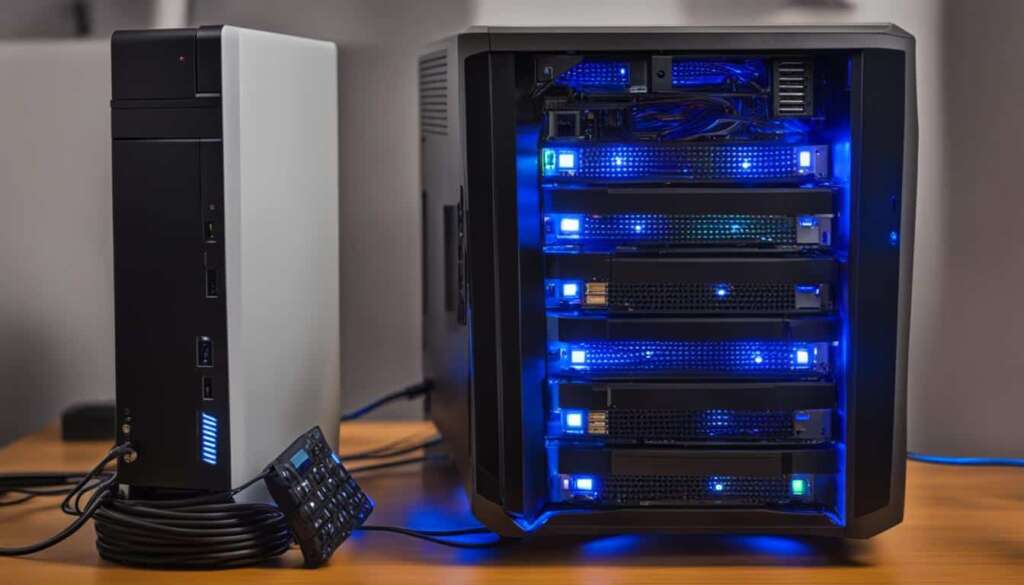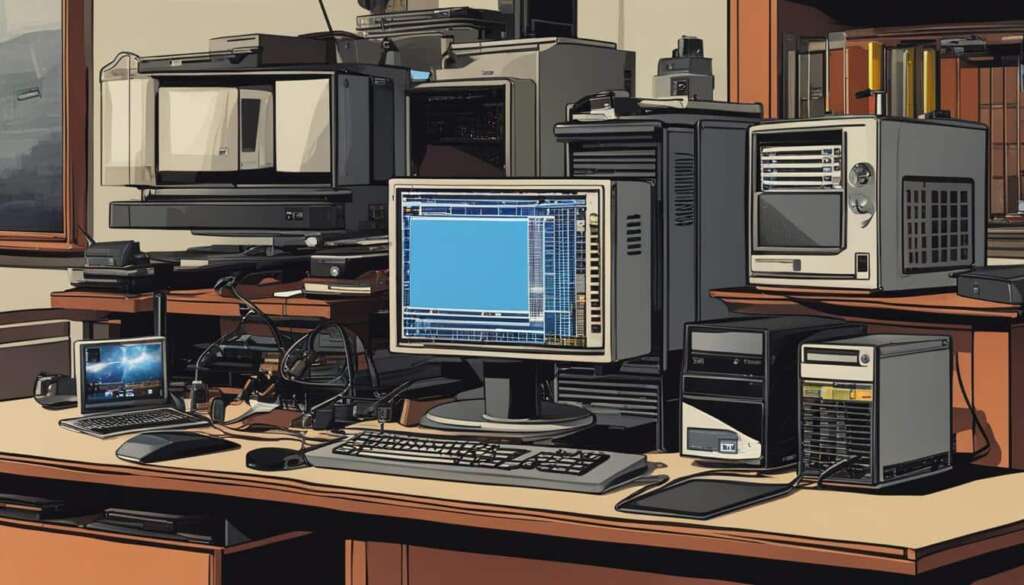Table of Contents
Welcome to our comprehensive guide on understanding server software and choosing the best operating system (OS) for your PC server. When it comes to PC as server OS choices, it’s essential to explore the options that will meet your specific needs. This article will provide you with a PC server OS guide, comparing different options and offering recommendations to help you make an informed decision.
The Benefits of Server Operating Systems
Server operating systems offer numerous advantages over standard operating systems when it comes to running servers and managing critical applications. These specialized operating systems are designed to support platforms like web servers, application servers, database servers, and email servers, among others. They offer a range of benefits that make them essential for businesses and organizations.
One of the key benefits of server operating systems is their ability to handle unlimited user connections. Unlike standard operating systems, server operating systems have the capacity to accommodate a large number of users simultaneously, without compromising performance or stability. This makes them ideal for businesses that require high levels of user engagement and interaction.
Server operating systems also provide advanced memory management capabilities. They are optimized to allocate and distribute memory efficiently, allowing servers to handle resource-intensive tasks and applications without experiencing slowdowns or crashes. This ensures smooth and reliable operation, even under heavy workloads.
In addition to user connections and memory management, server operating systems offer advanced network optimizations. They are designed to prioritize network traffic, optimize data transfer rates, and ensure reliable communication between servers and clients. This results in improved network performance, reduced latency, and enhanced user experience.
Table: Comparison of Server Operating Systems
| Server Operating System | Advantages |
|---|---|
| Windows Server | • Familiar GUI • Extensive third-party application support • Support for symmetric multi-processor systems |
| Linux | • Free and open-source • High security • Wide variety of distributions |
| Red Hat Enterprise Linux (RHEL) | • Extensive support and security solutions • Comprehensive server-related software collection |
| UNIX-Based Operating Systems | • Multi-user environment • Built-in TCP/IP support • High stability and security |
| NetWare (Novell Open Enterprise Server) | • Support for multiprocessors • Top-notch file sharing and printing functions |
| macOS Server | • Easy administration • Intuitive GUI • Great support |
| FreeBSD | • Speed and security • Extensive software collection |
Overall, server operating systems offer a range of benefits that make them essential for running servers and managing critical applications. Their ability to handle unlimited user connections, manage memory efficiently, optimize networks, and provide advanced security and stability features make them the ideal choice for businesses of all sizes.
Understanding Server Operating Systems
A server operating system is a specialized operating system designed to run on servers and cater to the needs of multi-user, business-critical applications. Unlike desktop operating systems, server operating systems offer features and functionalities that are specifically tailored for client-server architecture and serving client requests.
Server operating systems are equipped with advanced capabilities for managing users, implementing robust security measures, and performing various administrative tasks. They facilitate the smooth operation of different server platforms such as web servers, mail servers, file servers, database servers, and application servers.
Server operating systems play a crucial role in ensuring uninterrupted service, scalability, and security for businesses. They provide the foundation for running critical applications, managing resources effectively, and maintaining high levels of performance and reliability.
Key Features of Server Operating Systems
- Multi-user support: Server operating systems are designed to handle simultaneous connections from multiple users, allowing them to access shared resources and applications.
- Enhanced security: Server operating systems offer robust security measures to protect sensitive data and prevent unauthorized access to servers.
- Centralized management: These operating systems provide centralized management tools that enable administrators to efficiently monitor and control server resources, user permissions, and system configurations.
- Scalability: Server operating systems are designed to handle increasing workloads and resource demands, allowing businesses to easily scale their server infrastructure as needed.
- Reliability and availability: Server operating systems incorporate features like fault tolerance, high availability, and clustering to ensure uninterrupted service and minimize downtime.
| Server Operating System | Main Features |
|---|---|
| Windows Server | Enterprise-level management, extensive application support |
| Linux | Stability, security, flexibility, wide range of distributions |
| Red Hat Enterprise Linux (RHEL) | Extensive support, security patches, and upgrades |
| UNIX-Based Operating Systems | Multi-user environment, built-in TCP/IP support, stability, security |
| NetWare | Multiprocessor support, file sharing, printing functions |
| macOS Server | Easy administration, intuitive GUI, good support |
| FreeBSD | Speed, security, extensive software collection |
Choosing the right server operating system depends on various factors, including the specific requirements of your business, the type of applications you run, and your IT infrastructure. Consider the features, performance, security, and compatibility of different server operating systems to make an informed decision that best suits your organization’s needs.
Common Server Operating Systems
In today’s digital landscape, there are several common server operating systems that are widely used by businesses and organizations. These operating systems offer a range of features, performance capabilities, and management options to meet the diverse needs of different server environments. In this section, we will explore some of the most popular server operating systems available today.
Windows Server
One of the most well-known server operating systems is Windows Server, developed by Microsoft. It offers a familiar user interface and extensive support for third-party applications, making it a popular choice for businesses. Windows Server provides enterprise-level management, robust data storage capabilities, and seamless integration with Microsoft’s suite of software and services.
Linux
Linux, an open-source operating system, has gained significant popularity in the server world due to its stability, security, and flexibility. Linux server distributions such as Ubuntu, Debian, and Fedora offer a wide variety of options for different server requirements. Linux servers are known for their strong security measures, extensive software repositories, and the ability to customize the operating system to suit specific needs.
Red Hat Enterprise Linux (RHEL)
Red Hat Enterprise Linux (RHEL) is a paid Linux distribution that caters to the needs of enterprise-level organizations. RHEL offers extensive support, regular patches and upgrades, and solutions for security vulnerabilities. It provides a comprehensive collection of server-related software and is widely used in corporate environments where stability, reliability, and support are paramount.
UNIX-Based Operating Systems
UNIX-based operating systems, known for their stability and security, have been a staple in the server world for many years. UNIX operating systems offer a multi-user environment, built-in TCP/IP support, and a high level of stability. Although there are different versions of UNIX from various vendors, these operating systems provide a solid foundation for server applications and have a loyal user base.
NetWare
NetWare, now known as Novell Open Enterprise Server (OES), was widely used in early local area networks (LANs). It offered robust file sharing and printing functions, support for multiprocessors, and a range of management interfaces. However, NetWare’s popularity has waned over the years due to high costs, lack of support, and limited third-party application compatibility.
macOS Server
macOS Server, developed by Apple, is a UNIX-like server operating system that provides easy administration and a user-friendly graphical interface. It offers excellent support for Apple hardware and services, making it an ideal choice for organizations heavily invested in the Apple ecosystem. However, macOS Server’s compatibility is limited to Apple hardware and may not offer the same level of flexibility as other server operating systems.
FreeBSD
FreeBSD is a free and open-source Unix-like operating system known for its speed, security, and extensive software collection. It offers excellent performance as a mail server, web server, firewall, and more. FreeBSD is highly customizable and provides robust security features. However, it may require more technical expertise to configure and maintain compared to other server operating systems.
| Operating System | Key Features | Pros | Cons |
|---|---|---|---|
| Windows Server | Familiar interface, extensive application support | Enterprise-level management, robust data storage capabilities | User-based licensing, higher security threats |
| Linux | Stability, security, flexibility | Free and open-source, strong security measures, extensive software repositories | Requires technical knowledge for installation and maintenance |
| Red Hat Enterprise Linux (RHEL) | Extensive support, regular patches and upgrades | Comprehensive software collection, widely used in corporate environments | Expensive training courses, lack of personalized solutions |
| UNIX-Based Operating Systems | Multi-user environment, built-in TCP/IP support, stability | Stability, security, solid foundation for server applications | Different versions from various vendors, less standardized |
| NetWare | Robust file sharing and printing functions, management interfaces | Support for multiprocessors, large-capacity physical memory management | High price, poor support, limited third-party app compatibility |
| macOS Server | Easy administration, user-friendly interface | Great support, easy workload distribution | Limited to Apple hardware, fewer third-party application options |
| FreeBSD | Speed, security, extensive software collection | Highly customizable, robust security features | Steep learning curve, poorer community support, lack of driver support |
Windows Server: Powering Your Business with Microsoft’s Robust Server Operating System

When it comes to server operating systems, Windows Server from Microsoft is a leading choice for businesses worldwide. With its array of features and capabilities, Windows Server empowers organizations to efficiently manage their servers and deliver reliable services to their users.
Key Features of Windows Server
Windows Server offers a range of features that make it a robust and versatile server operating system:
- Active Directory: Windows Server provides Active Directory, a central repository for managing users, groups, and resources. This feature simplifies user administration and enhances security.
- Remote Desktop Services: Windows Server allows remote access to virtual desktops and applications, enabling flexible work options and enhancing productivity.
- Powerful Virtualization: Windows Server includes Hyper-V, a hypervisor-based virtualization platform that enables businesses to create and manage virtual machines efficiently.
- Scalability and High Availability: Windows Server supports clustering and failover capabilities, ensuring the availability of critical services and applications.
- Enhanced Security: Windows Server incorporates robust security measures, including Windows Defender and advanced threat protection, to safeguard your systems and data.
The Pros and Cons of Windows Server
“Windows Server offers a user-friendly interface and seamless integration with Microsoft technologies, making it an attractive choice for businesses. However, it is important to consider the following pros and cons before making a decision:”
| Pros | Cons |
|---|---|
|
|
While Windows Server offers a comprehensive set of features and benefits, it is important to evaluate your specific requirements and consider factors such as licensing costs and potential security risks before choosing it as your server operating system.
Linux: A Powerful Choice for Your Server
When it comes to server operating systems, Linux is a top contender. With its stability, security, and flexibility, Linux has gained popularity among users worldwide. There are several Linux server distributions available, each with its own unique features and benefits.
One popular Linux server distribution is Ubuntu Server. Known for its user-friendly interface and strong community support, Ubuntu Server offers a reliable platform for hosting websites, running applications, and managing data. Debian Server is another well-regarded option, focusing on stability and security.
If you’re looking for a highly customizable Linux distribution, Arch Linux might be the ideal choice. With its minimalistic approach and rolling-release model, Arch Linux allows you to build a server environment tailored to your specific needs. For enterprise-level solutions, SUSE Linux Enterprise Server offers advanced features and professional support.
While Linux servers have numerous benefits, it’s important to consider the potential drawbacks. Linux is known for its steep learning curve, and installation and maintenance may require more technical knowledge compared to other operating systems. Additionally, some third-party applications may have limited support for Linux distributions. However, with the right expertise and resources, Linux can provide a secure and reliable foundation for your server.
Table: Comparison of Linux Server Distributions
| Linux Server Distribution | Features | Pros | Cons |
|---|---|---|---|
| Ubuntu Server | User-friendly interface, strong community support | Reliable platform, extensive documentation | Limited enterprise-level features |
| Debian Server | Focus on stability, security | Robust package management, wide software selection | Slightly conservative updates |
| Arch Linux | Highly customizable, rolling-release model | Efficient performance, up-to-date software | Steep learning curve, requires advanced knowledge |
| SUSE Linux Enterprise Server | Enterprise-level features, professional support | Scalable and reliable, comprehensive management tools | Paid support required for some features |
In conclusion, Linux offers a powerful and versatile option for your server needs. With its wide range of server distributions, including Ubuntu Server, Debian Server, Arch Linux, and SUSE Linux Enterprise Server, you can select the one that best suits your requirements. Consider the features, pros, and cons of each distribution to make an informed decision for your server setup.
Red Hat Enterprise Linux (RHEL)
Red Hat Enterprise Linux (RHEL) is a powerful and reliable server operating system that offers a wide range of features and capabilities. It is widely used in corporate environments due to its comprehensive support, regular patches, and security upgrades. RHEL provides a stable and scalable platform for running critical business applications, making it a popular choice for organizations of all sizes.
One of the key features of RHEL is its extensive software collection, which includes a wide range of server-related tools and applications. This allows users to customize their server environment according to their specific needs and requirements. RHEL also comes with excellent support from Red Hat, ensuring that users have access to expert assistance and solutions for any issues that may arise.
While RHEL offers numerous advantages, it is important to consider some potential drawbacks. Firstly, RHEL is a paid operating system, which means that organizations need to budget for the cost of licensing. Additionally, training courses and certifications for RHEL can be expensive, especially for organizations that require multiple employees to be trained. Finally, some users may find that RHEL lacks the level of personalized support and solutions that other operating systems may offer.

Key Features of Red Hat Enterprise Linux (RHEL)
- Comprehensive support and regular patches
- Extensive software collection for server-related tasks
- Stability and scalability for critical business applications
- Excellent support from Red Hat
Pros and Cons of Red Hat Enterprise Linux (RHEL)
| Pros | Cons |
|---|---|
| Comprehensive support and regular patches | Paid operating system |
| Extensive software collection | Expensive training courses |
| Stability and scalability | Limited personalized support |
UNIX-Based Operating Systems
UNIX-based operating systems are a family of powerful and reliable server operating systems known for their stability, security, and versatility. These operating systems, which include popular options such as Linux, FreeBSD, and macOS Server, are widely used in various industries and offer unique features and benefits.
One of the key advantages of UNIX-based operating systems is their multi-user environment, allowing multiple users to access the server simultaneously. This makes them ideal for environments that require high levels of collaboration and resource sharing. Additionally, UNIX-based systems have built-in TCP/IP support, ensuring seamless communication and connectivity across networks.
However, it’s important to consider the potential drawbacks of UNIX-based operating systems. While they offer a high level of stability and security, they may require more technical knowledge for installation and maintenance compared to other server operating systems. Additionally, the availability of personalized solutions and community support may vary depending on the specific UNIX-based system chosen.
Overall, UNIX-based operating systems provide a robust foundation for server environments, offering advanced features, security, and reliability. Whether you choose Linux, FreeBSD, or macOS Server, selecting a UNIX-based operating system can help meet your organization’s server needs effectively.

Table: Comparison of UNIX-Based Operating Systems
| Operating System | Features | Pros | Cons |
|---|---|---|---|
| Linux | High security, wide variety of distributions, open-source software | Free and open-source, extensive software collection | Requires more technical knowledge for installation and maintenance |
| FreeBSD | Speed, security, extensive software collection | Free and open-source, easily configurable for various server purposes | Steeper learning curve, poorer community support |
| macOS Server | Easy administration, intuitive GUI, great support | Seamless integration with Apple hardware, workload distribution | Limited third-party application options, higher hardware costs |
NetWare: Powerful Features and Considerations
NetWare, now known as Novell Open Enterprise Server (OES), is a server-based network operating system that was widely used in early LANs. Offering a range of robust features, NetWare was known for its support for multiprocessors, efficient physical memory management, and top-notch file sharing and printing functions. It also provides a variety of management interfaces for streamlined server administration.
NetWare boasts exceptional performance and reliability, making it a suitable choice for businesses requiring a stable and secure network environment. Its advanced capabilities include fault tolerance, scalable architecture, and high-speed data access. Additionally, NetWare’s efficient implementation of Novell Directory Services (NDS) allows for effective user management and simplified network administration.
However, it is important to consider a few factors before choosing NetWare as your server operating system. Firstly, the installation process can be complex and time-consuming, requiring in-depth technical knowledge. Additionally, NetWare has a high price point, which may not be suitable for budget-conscious organizations. Furthermore, compared to other operating systems, NetWare has limited third-party application support, potentially limiting your software options.
Overall, NetWare offers a robust set of features for network server environments, with impressive performance and reliability. However, its complex installation process, high cost, and limited third-party application support should be carefully considered before making a decision.
NetWare Features Overview:
| Features | Description |
|---|---|
| Fault Tolerance | This feature ensures system reliability by providing redundancy and failover mechanisms. |
| Scalable Architecture | NetWare allows for easy expansion and adaptability to accommodate growing business needs. |
| High-Speed Data Access | NetWare provides efficient data transfer and quick access to network resources. |
| Novell Directory Services (NDS) | NetWare’s directory service simplifies user management and network administration. |
| Robust File Sharing | NetWare offers reliable and secure file sharing capabilities for seamless collaboration. |
| Print Services | NetWare facilitates efficient network printing with extensive print management features. |
“NetWare provides a powerful and reliable foundation for network server environments, with impressive fault tolerance, scalability, and high-speed data access. Its Novell Directory Services (NDS) streamline user management and administration. However, organizations should be prepared for the complex installation process, higher cost, and limited third-party application support associated with NetWare.”
macOS Server: Apple’s Versatile Server Operating System
macOS Server is a powerful and versatile server operating system developed by Apple. Designed to deliver exceptional performance, security, and ease of use, macOS Server is an excellent choice for businesses and organizations looking to harness the power of Apple technology for their server needs.
One of the standout features of macOS Server is its seamless integration with Apple’s ecosystem. With built-in support for macOS, iOS, iPadOS, and other Apple devices, macOS Server allows for seamless collaboration and file sharing across multiple devices. This level of integration ensures that businesses can leverage the full power of Apple’s ecosystem to enhance productivity and streamline workflows.
macOS Server Features:
- Easy administration with an intuitive GUI
- Seamless integration with Apple’s ecosystem
- Robust file sharing and collaboration capabilities
- Advanced security features to safeguard data
- Efficient workload distribution for optimized performance
- Comprehensive management tools for streamlined administration
While macOS Server offers a wide range of benefits, there are a few considerations to keep in mind. Firstly, macOS Server is designed to run exclusively on Apple hardware, which can be more expensive compared to other server options. Additionally, the range of third-party applications available for macOS Server may be more limited compared to other server operating systems.
| Pros | Cons |
|---|---|
| Seamless integration with Apple’s ecosystem | Runs only on Apple hardware |
| Intuitive GUI for easy administration | Limited third-party application options |
| Advanced security features | Higher cost compared to some alternatives |
In conclusion, macOS Server is a versatile server operating system that offers seamless integration with Apple’s ecosystem, intuitive administration, and robust security features. However, it is important to consider the exclusive hardware requirement and limited third-party application options when evaluating macOS Server for your organization’s server needs.
FreeBSD: A Free and Open-Source Server Operating System
FreeBSD is a powerful and versatile server operating system that offers a range of features and benefits for businesses seeking a reliable and cost-effective solution. As a free and open-source operating system, FreeBSD provides the flexibility to customize and adapt it to suit specific server requirements. It is widely regarded for its speed, security, and extensive software collection, making it a popular choice among developers and system administrators.
One of the key advantages of FreeBSD is its speed. It is optimized for performance, allowing servers to handle high workloads efficiently and deliver fast response times. This makes it ideal for applications that require quick data processing and real-time performance. Additionally, FreeBSD offers a robust security framework, protecting servers from potential threats and vulnerabilities. Its built-in security features offer peace of mind to businesses handling sensitive data and customer information.
While FreeBSD offers numerous benefits, it is important to consider some potential drawbacks. Compared to other server operating systems like Linux, FreeBSD may have a steeper learning curve. Administrators and developers should be prepared to invest time and effort in understanding FreeBSD’s unique environment. Additionally, FreeBSD may have poorer community support compared to Linux distributions, which could lead to longer troubleshooting times and fewer readily available resources.
| Pros | Cons |
|---|---|
| Free and open-source | Steep learning curve |
| Speed and performance optimization | Poorer community support |
| Robust security framework | Limited third-party application support |
FreeBSD provides businesses with a reliable and cost-effective server operating system solution. Its speed, security, and extensive software collection make it an attractive choice for organizations looking to optimize their server performance and protect their data. However, adopting FreeBSD may require a learning curve and potentially limited community support. By carefully evaluating the requirements and considering the pros and cons, businesses can make an informed decision regarding the suitability of FreeBSD for their server infrastructure.
Conclusion
In conclusion, choosing the right server operating system for your PC server is a crucial decision that can greatly impact your organization’s efficiency and productivity. It is important to consider factors such as the intended purpose of the server, scalability, security requirements, management and administration needs, and cost considerations.
Windows Server, Linux distributions like Ubuntu and Debian, Red Hat Enterprise Linux (RHEL), UNIX-based operating systems, NetWare (now Novell Open Enterprise Server), macOS Server, and FreeBSD are all popular choices with their own unique set of pros and cons. Each operating system offers different features, performance capabilities, and management options.
To make an informed decision, it is imperative to carefully evaluate your organization’s specific requirements and goals. Consider the level of technical expertise available within your team, the compatibility of existing software and applications, and the level of support and training required. By taking these factors into account, you can choose the server operating system that best aligns with your organization’s needs and objectives, ensuring seamless and reliable server performance.
In conclusion, selecting the ideal server operating system involves a thoughtful analysis of various factors, ultimately leading to a well-informed decision that will optimize your PC server’s functionality and serve your organization’s objectives effectively.
FAQ
What are server operating systems?
Server operating systems are advanced operating systems specifically designed to run on servers and offer features for managing users, implementing security, and other administrative processes.
What benefits do server operating systems offer?
Server operating systems provide benefits such as unlimited user connections, more memory, advanced network optimizations, and a focus on security, stability, and cooperation.
What are some common server operating systems?
Common server operating systems include Windows Server, Linux distributions like Ubuntu and Debian, Red Hat Enterprise Linux (RHEL), UNIX-based operating systems, NetWare (now known as Novell Open Enterprise Server), macOS Server, and FreeBSD.
What is Windows Server?
Windows Server is a server operating system developed by Microsoft that offers enterprise-level management, data storage, and a wide array of applications.
What is Linux?
Linux is a family of UNIX-like operating systems known for their stability, security, and flexibility. It is free and open-source, offering high security and a wide variety of distributions.
What is Red Hat Enterprise Linux (RHEL)?
Red Hat Enterprise Linux (RHEL) is a paid Linux distribution known for its extensive support, patches, upgrades, and solutions for security vulnerabilities. It is widely used in corporate environments.
What are UNIX-based operating systems?
UNIX-based operating systems offer a multi-user environment, built-in TCP/IP support, and a high level of stability and security. However, they are paid operating systems with different versions from different vendors.
What is NetWare?
NetWare, now known as Novell Open Enterprise Server (OES), is a server-based network operating system that offers support for multiprocessors, large-capacity physical memory management, and top-notch file sharing and printing functions. However, it has a high price and poor support.
What is macOS Server?
macOS Server is a UNIX-like server operating system based on macOS, developed by Apple. It offers easy administration, an intuitive GUI, and great support. However, it only runs on Apple hardware and may have limited third-party application options.
What is FreeBSD?
FreeBSD is a free and open-source Unix-like operating system known for its speed, security, and extensive software collection. It offers good security and a variety of tools, but may have a steeper learning curve and lack driver support compared to Linux.
How do I choose the right server operating system for my PC server?
Choosing the right server operating system depends on various factors such as the intended purpose, scalability, security, management, administration needs, and cost considerations. Evaluate the specific requirements and goals of your organization to make an informed decision.












